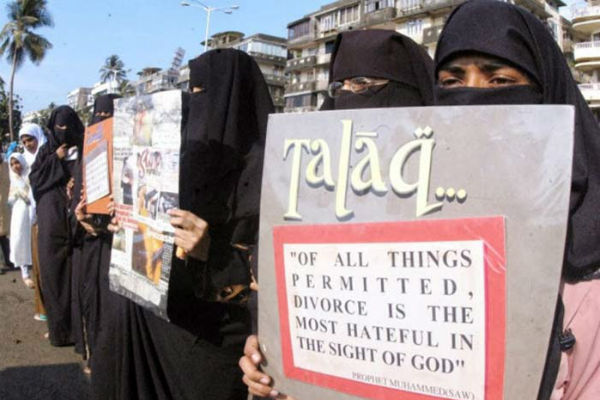
Is the Triple Talaq Bill a showcase of Desperation?
Is the Triple Talaq Bill a showcase of Desperation?
- Sayan Basak
When
the apex court pronounced talaq-e-biddat (triple talaq) as
unconstitutional last year in August, it provided a sense of relief and
security to all Muslim women of this country.
Almost
everyone lauded the judgment. It was indeed a landmark judgment, and the apex
court directed the government to formulate a law to debar this
arbitrary and archaic form of practice to dissolve a marriage, which gave
high-handed impunity to the husband, and provides no remedy to the aggrieved
wife.
Following
the apex court directions, the government tabled “The Muslim Women
(Protection of Rights on Marriage) Bill 2017” or what is more commonly known as
the “Triple Talaq Bill”. Unfortunately, its provisions stand contrary to its
name.
There
are some fundamental problems with this Act, as the whole act in itself, is a
contradiction. Section 3 makes the pronouncement of talaq through any
form, electronic, verbal or written, void and illegal. Section
4 makes it a criminal offence with the imprisonment, which may be extended
to three years. It also makes it more stringent by making it a non-bailable and
cognizable offence. This whole act seems ambiguous and illogical. There are
questions which remain unanswered.
1. Fundamentally,
Muslim marriage is a civil contract. So how can there be a penal liability
of its dissolution?
2. The
word ‘void’, according to the Oxford dictionary, means something that is not
valid or legally binding. So how does a word or act which is not legally
binding, create a case of any liability, either civil or penal?
3. Section
7 makes this act cognizable and non-bailable. This makes it impossible for
any reconciliation between a husband and a wife.
4. The
offence doesn’t specifically provide any description of the
complainant, which means anyone can be a complainant like in any other criminal
offence under CrPC. This, in my opinion, is very absurd and makes Muslim men
more vulnerable in the eyes of the law.
5. Section
5 talks about subsistence allowance for wife and children as determined by
the magistrate. Now, what is subsistence allowance? The Oxford dictionary
defines subsistence allowance as “an allowance or advance on someone’s
pay.” Under Indian law, subsistence allowance is a term used mostly
in service jurisprudence, especially in laws relating to workmen. The usage of
the term underlines the misogyny in the thought process of the law-makers who
consider the wife to be an employee of the husband.
6. But
the above provision of subsistence allowance is itself contradictory as a
husband is in jail. Under those circumstances, how can he be able to provide
any support for his family?
The
above act, which was passed in the lower house of the parliament
without any serious discussions and scrutiny can cause some severe consequence.
Now, as it is tabled in the upper house, they have a responsibility to pass
this act only after strict scrutiny, and it should be sent to a committee if
needed.
In
my opinion, this act shows the desperation of the BJP to prove themselves as
the messiah of the minority. But the question is, whether stringent laws
prevent a criminal act, or do they have reformatory capabilities?
It
is neither, a fact proven in many other criminally liable acts of rape, crime
against women, administrative and bureaucratic corruption etc. Another question
which arises is whether this whole issue requires a criminal and stringent law
when there is 498A IPC and The Dowry Prohibition Act is
already in place? Are the already existing acts, not appropriate to meet any
injustice?
Empirical
data show that, the percentage of women aggrieved by triple talaq was
0.2%. Thus, in my opinion, this overly enthusiastic positive sentiment for
Muslim women seems very flawed and nothing but a political stunt. The fact is,
that the question of gender justice has never been a priority for this
government, as matrimonial offences like marital rape still
need recognition as a criminal offence.
Death threats to
Deepika Padukone in the “Padmavati” controversy and many other cases of moral
policing perpetrated by factions of the Sangh Parivar and others like them,
often question women’s freedom and their independence.
The
way I see it, all these BJP leaders are a product of the RSS who think women
are not worthy enough to stand equally with men. Time and again, it has been
proven that the laws always had been highly influenced by the ideology of the
ruling party. Problems like triple talaq, marital rape, wife beating, etc. are
a problem of the mentality of people, which obviously require a criminal
action. But, we also need to understand it as a societal problem.
In
this man’s world, women are very often subject to mental and physical violence.
The very foundation of our society is against women, and so their upbringing and
that very foundation need to questioned and demolished to achieve a just
society.
The
laws like above, will only form discontent in the family and makes Muslim men
more vulnerable to criminal liability. This law is an absurd form of
legislation and shows the failure of the government to understand the whole
issue.
Sayan Basak
Associate
Director- Research and Publications- ProBono India
3rd Year, Bachelors of Technology, Department
of Polymer Science and Technology, University Of Calcutta
External Links and
References-
1. https://www.outlookindia.com/website/story/triple-talaq-verdict-draft/300623
2. https://thewire.in/169771/supreme-court-instant-triple-talaq/
3. http://www.prsindia.org/billtrack/the-muslim-women-protection-of-rights-on-marriage-bill-2017-5008/
4. http://www.thehindu.com/news/national/what-is-the-instant-triple-talaq-bill/article22296008.ece
5. http://www.thehindu.com/news/national/what-is-the-instant-triple-talaq-bill/article22296008.ece
6. https://www.lawctopus.com/academike/marriage-under-muslim-law/
8. http://www.thehindu.com/opinion/op-ed/a-very-flawed-law/article22288659.ece
9. http://www.thehindu.com/news/national/lok-sabha-passes-the-triple-talaq-bill/article22319663.ece
10. https://indiankanoon.org/doc/538436/
11. http://wcd.nic.in/act/dowry-prohibition-act-1961












